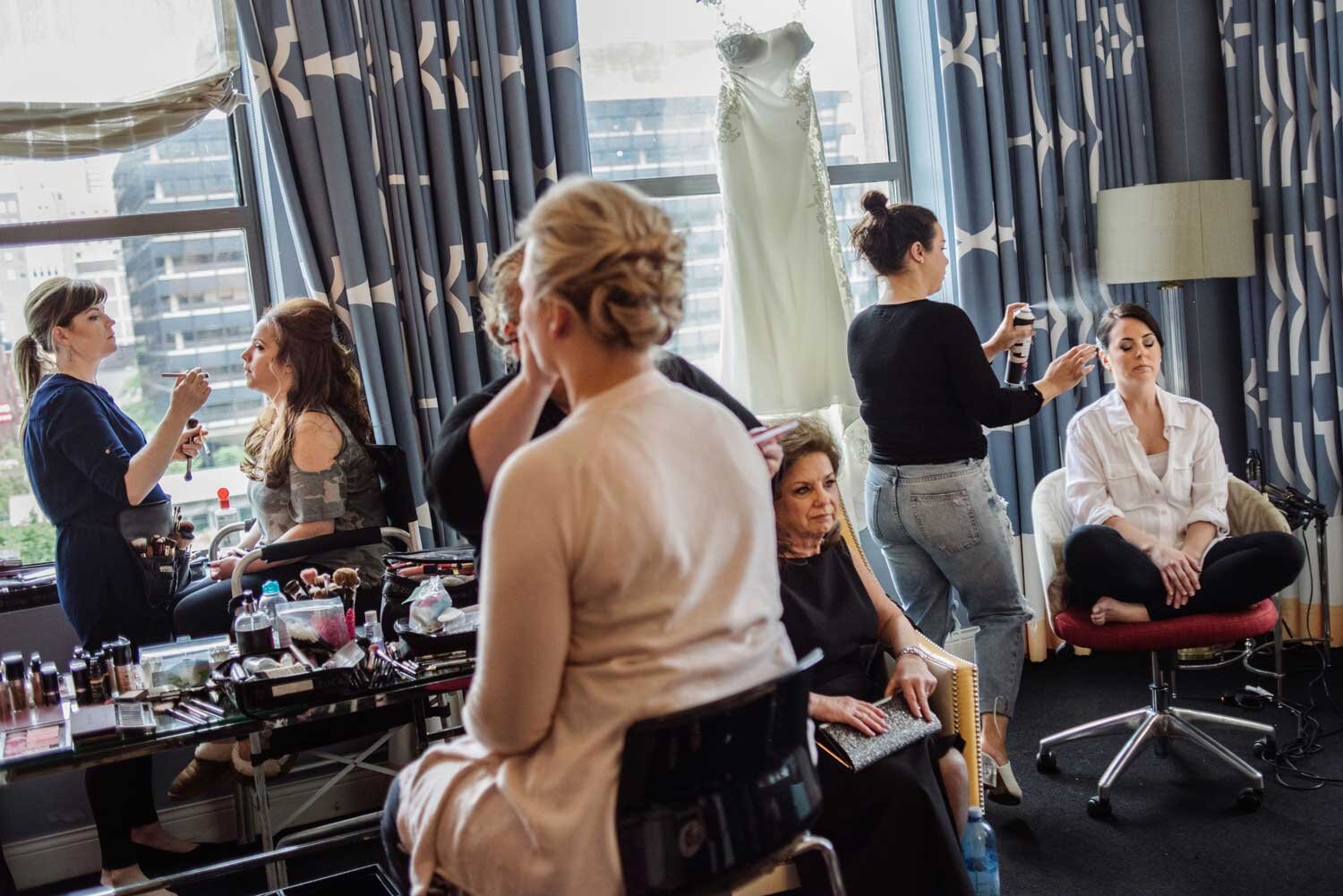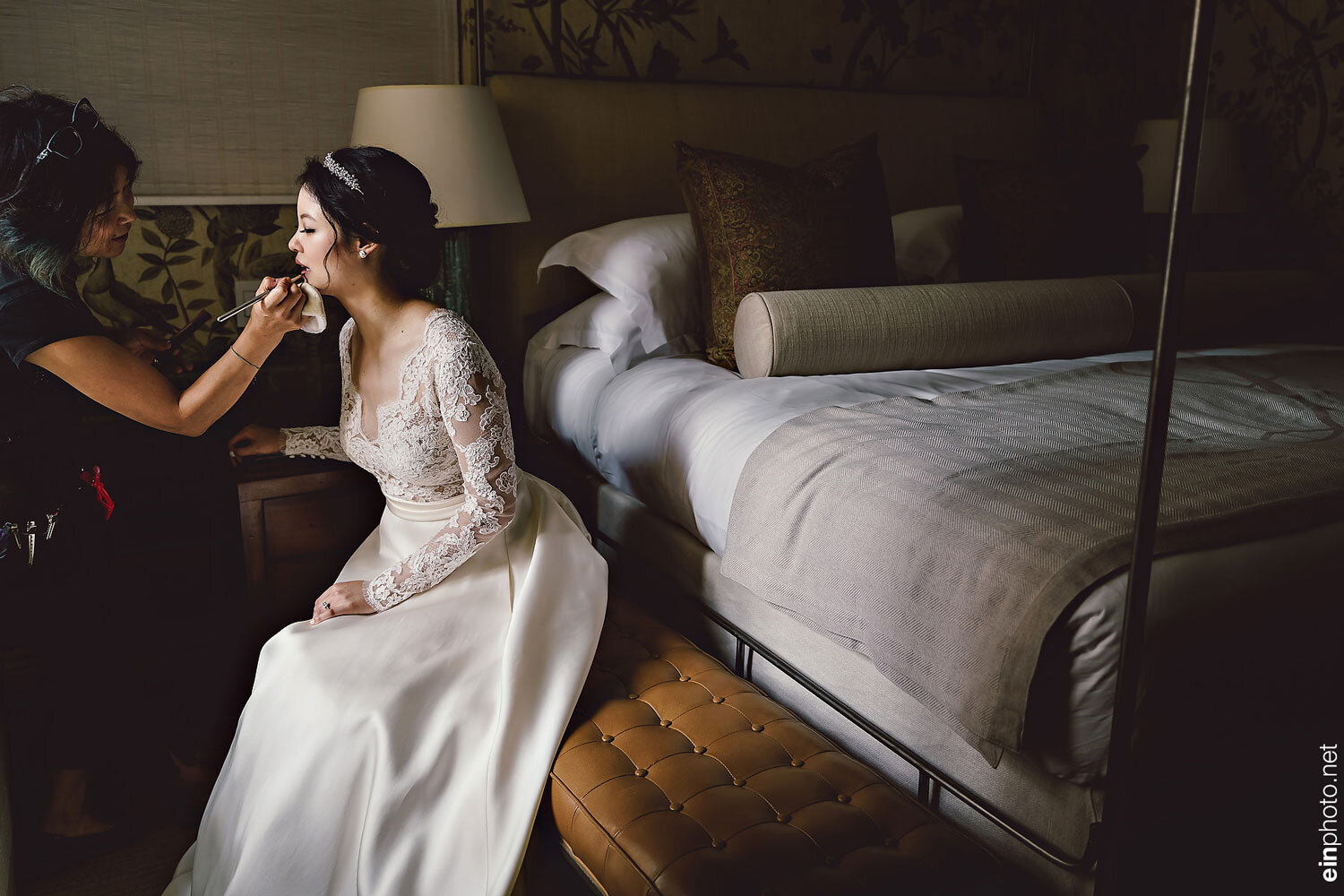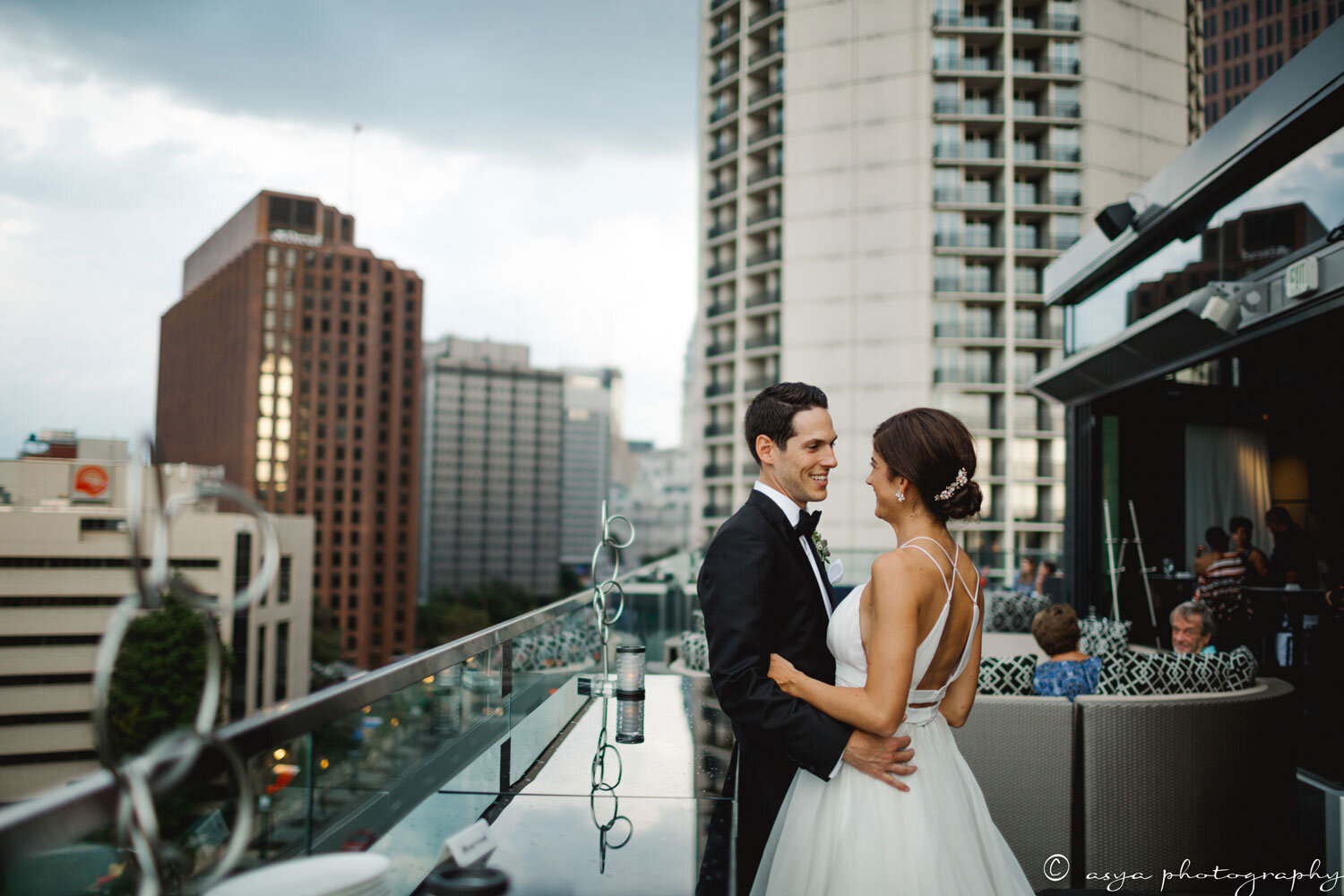Common Questions about Hotel Room Blocks
When the task of “secure hotel room blocks” pops up on your wedding planning checklist, it can feel like an incredibly daunting task. You want your guests to be able to comfortably celebrate with you, knowing that they have somewhere to get ready (if needed) and somewhere to sleep after the party – especially if your wedding requires travel.
If you’re a DPNAK client, don’t worry – I’m going to be able to take care of setting up your room blocks for you. I’ll just need your help in answering a few questions.
But to help break it down a bit more, here I’ll share what the heck a hotel room block is, what types of room blocks there are, and how to handle them.
Photo by Tyler Boye Photography of Jessica and Jared’s Hotel Bethlehem Wedding
What is a hotel room block?
A room block is an open or a guaranteed reservation (more on that in a bit) of ten rooms or more at a hotel or hotels close to your wedding venue. It’s set up for your guests so they know where to stay and allows you to easily plan some additional accommodations for them, like transportation to/from the wedding.
A room block is especially important for destination weddings or weddings where a lot of the guests are traveling to the area. This will make it easier for your guests to plan their travel plans early and easily.
Do room blocks cost money?
You, as the couple are only setting up a pre-negotiated rate for a block of rooms. Typically, each guest books and pays for their own room.
Setting up the pre-negotiated rate helps your guests organize their travel plans (and any transportation that you’ll be providing) by gathering some options close to your reception, and it helps the hotel be prepared for a larger group for your dates.
In most cases, it is not expected for the couple or host to pay for their guests’ accommodations, even with destination weddings.
What type of room blocks are there?
Here in Pennsylvania, there are two different types of room blocks that are most common: an open (or courtesy) block and a guaranteed block.
OPEN / COURTESY ROOM BLOCK
An open or courtesy room block is a designated number of rooms set aside for you with a cut-off date as to when the rooms can be booked. After the cut-off date (which is usually few weeks before your event), any unbooked rooms will be released and you will not be financially responsible for filling any of them.
GUARANTEED ROOM BLOCK
A guaranteed room block does exactly what it says: guarantees you a certain number of rooms. You and your group will be financially responsible for booking a certain percentage of rooms (called an “attrition rate”).
For example: Let’s say you have a guaranteed block for 25 rooms for two nights and your contract has an attrition rate of 80%. This means you would be responsible for filling a total of 40 room nights by the cut-off date. If they aren’t filled, you’re financially responsible for the remaining rooms in your block for a total of 40.
This attrition rate and cut-off date will be outlined in your room block agreement. As with all of your vendors, make sure you read and understand your contracts before agreeing to anything.
WHICH ROOM BLOCK WOULD WORK BEST?
You’re usually able to get a higher number of rooms with a guaranteed block vs. an open block. However, because plans can change (as we all learned so clearly with COVID), I almost always recommend doing an open, courtesy block.
For most couples, an open block is the best way to go. On average, you can get 10-20 rooms on an open block, though there are some hotels that can offer 25-30+ on an open block, based on their availability for your dates.
Once an open block is full, you can also ask your hotel to add more rooms to your block, based on their availability. For this reason, I recommend having your VIP guests book their rooms as early as possible. It will make your wedding day much smoother if your VIPs are all getting ready at (and returning to) one location, rather than multiple hotels.
When should we work on setting up our room block?
Setting up your room block as early as possible is the best way to ensure the hotel has enough room availability.
Some hotels have restrictions as to how early you can set up a block, but most will allow it up to 12 months in advance.
This is really important if you’re getting married around a popular time of year or an event that is very popular in the area that you’re getting married.
Photo by Meg Brock Photography of Lauren and Matt’s Union Trust Wedding
Where should we set up the hotel room blocks?
Your hotel room blocks should be set up as close as possible to your wedding venue. If your ceremony and reception are taking place at two different locations, focus on a hotel that’s close to both with a preference of being closer to the reception venue vs. ceremony venue, if needed. If you’re providing transportation, doing this will allow you to easily get your guests back to their rooms after the party.
Depending on your location, it’s helpful when a hotel is also close to other things to do in the area. Can your guests walk to a cafe? Or drive to a nearby shopping area? Are there places to eat?
These amenities might not be possible in some locations, but where they are, that should be a deciding factor for you. If you’re having a majority of guests travel or hosting a destination wedding, you can think of these amenities as “best of” highlights to share with your guests. Making it all convenient to your wedding is the best bonus.
How many hotels should we set up room blocks at?
The first thought is often to setup blocks in as many spots as possible. In most cases, I do NOT recommend this (though it’s great to inquire with a handful initially to get some more information).
In my experience, it’s best to setup your room blocks in the least amount of hotels as possible. Ideally, one or two and no more than three. This makes it easier for your guests to make their decision — having too many options can be overwhelming.
When setting up a block at two different hotels, consider a higher and lower price point to accommodate most guests’ budgets. Some guests will be happy to splurge on the nicer room and others will feel better going with the more economical option.
There are a few other important reasons that having one or two hotel room blocks is better than having a whole bunch:
The more blocks you have, the more spread out your guests will be. On the whole, your guests want to spend more time together and will meet up outside of your main events. Having many hotels means it’ll be harder to coordinate get togethers.
The more blocks you have, the more transportation you’ll need. And the more transportation you need, the more it adds to your budget. (If you’re not providing transportation for your guests, this isn’t as much of a factor.)
The more blocks you have, the more places you’ll need to drop off welcome bags, weekend itineraries, and anything else you’re doing for your guests.
Having blocks at one or two spots keeps things simple, easy to manage, and makes for a great guest experience.
Photo by EIN Photography of Vivian and Josh’s Harold Pratt House Wedding
How many rooms will we need?
This question is a little more difficult for me to answer for you, because it depends a LOT on YOUR guest list.
As a starting point, I recommend looking at your guest list and seeing which guests are a) likely to attend and b) traveling more than 30-45 minutes to your wedding destination. (if you’re using the DPNAK Workbook, you can check these guests as “out of town” and it will track the number for you)
If your guests are more local, some people still prefer to get a room to have a nice night out and keep the party going. But not as many rooms will be needed compared to when a majority of guests are doing a lot of traveling.
When counting, you’ll want to count couples and families as one room as they typically stay together. So two guests who are partners = one room. Don’t forget to count yourselves and any parents, immediate family, wedding party, and VIPs who will need a room for getting ready.
While you can set up an open block for more rooms than you think you’ll need, I don’t recommend asking for a block of 40 rooms if you know you’ll only need 10. If you’re choosing a guaranteed block, I’d opt for as close of a number needed as you can estimate to keep your budget for other priorities.
Photo by Asya Photography of Ali and Matt’s Logan Hotel Wedding
How many nights should the block be set up for?
Most couples set up a block for at least the night before and the night of their wedding. Most guests who are traveling will need a room for those two nights and extend their stay before or after with the hotel, as needed, when they’re booking.
Keep in mind that most check-in times are in the afternoon around 3pm-4pm. Most guests, and ESPECIALLY you and your VIPs, will need access to their room sooner, so make sure guests are aware the hotel cannot guarantee check-in before that time. (A request can be made but I’ve yet to see a hotel guarantee early check-in without booking the room for the night before.)
Can we negotiate for added perks?
Some hotels will be able to offer complimentary nights, room upgrades, parking, wifi, and more – based on the type of block you have and how many rooms you’re able to fill.
When securing a block, you can ask if there are “any special concessions based on the pickup”. Most will know what this means, but don’t automatically expect something in return.
Again – as with all of your vendors, make sure you read and understand your contracts when agreeing to anything.
How should we share our block with our guests?
Traditionally, you can include an “Accommodations” card with your wedding invitations that explains where guests can reserve a room. This is usually just an additional insert with your invitation sharing the hotel information with your guests, how to access the group rate, along with any contact information for booking.
However, it’s often easier to point guests to your wedding website and link to the important information on there. You will likely share your wedding website with your guests before your invitations are mailed. (I highly recommend sharing your wedding website on your Save The Dates, and for any showers, if applicable.) This lets your guests get a head start on their travel plans, and you can edit the information as needed if you are filling your open block of rooms early.
(Or do both!)
Not every guest will check your wedding website, but they will need to open your in\vitation, so sharing your block information both physically and digitally will be the best of both worlds.
Your VIPs and early birds that are excited to look at your website will feel like they got a head-start on planning, and the “Accommodations” card insert can be a gentle reminder that they really need to book their room, if needed.
Ready to get started?
If you’re looking for a little more help in navigating hotel room blocks, shop the Questions to Ask About Hotel Room Blocks Worksheet in the Bundle in my Shop at DPNAK.
This minimally designed worksheet gives you all of the questions you need to ask (and WHY) so that you can reach out to hotels with confidence.
If you’re a DPNAK couple, this worksheet is included for you in your Resource Library.




